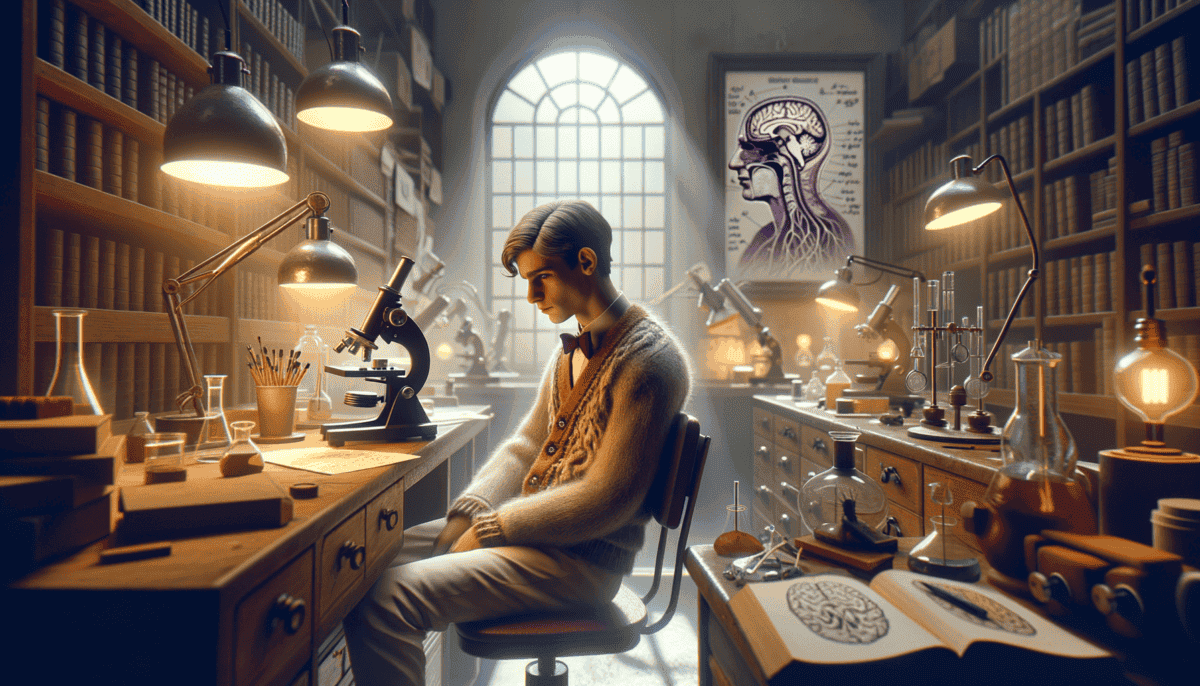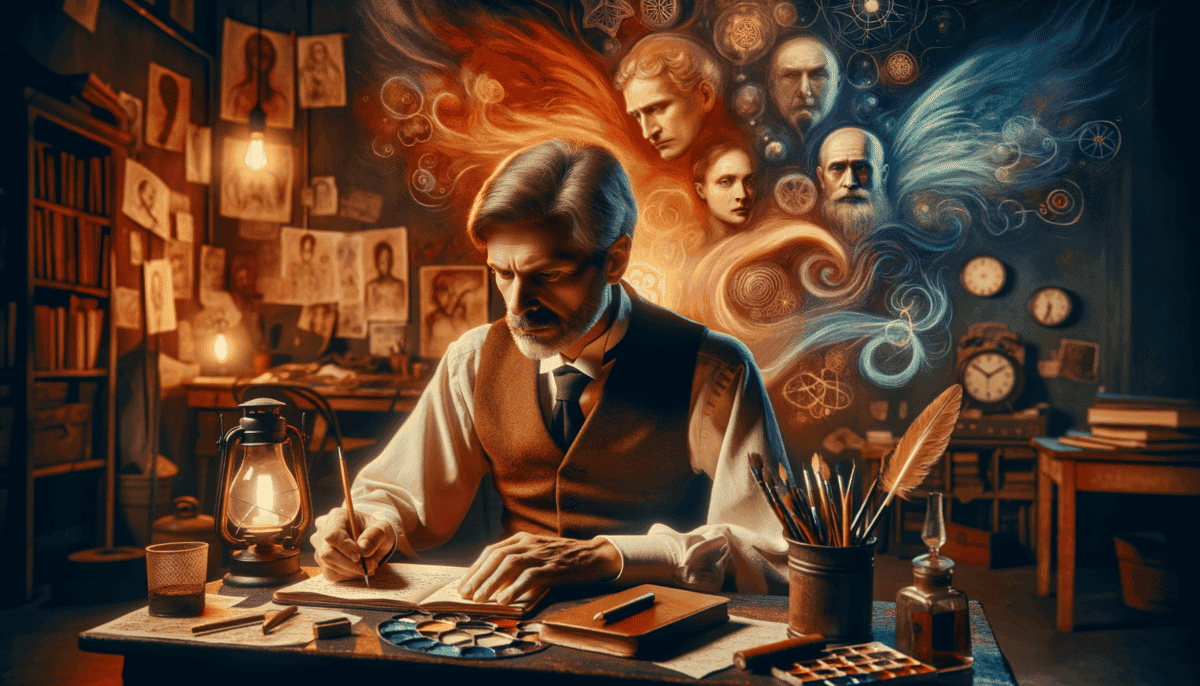The Curious Young Mind
Little Sigmund peeked out his window in Vienna. The year was 1860, and he was just four years old. The streets were busy with horse-drawn carriages and people in fancy clothes.
His mother smiled warmly. “That’s a very smart question, my dear. People are like puzzles – each one is different and special.”
Sigmund lived with his big family in a cozy apartment. He had seven brothers and sisters! But Sigmund was special. His parents could see how clever he was, even as a little boy.
A Special Boy
Every night, Sigmund would sit at the dinner table with a book. While other children played with toys, he wanted to learn more and more. His father gave him a special lamp so he could read after dark.
At school, Sigmund was always at the top of his class. His teachers were amazed at how well he could remember things. He loved to ask questions about everything:
- Why do people have dreams?
- What makes us feel happy or sad?
- How does our brain work?
One day, while walking home from school, Sigmund saw a man acting strangely on the street. The man was talking to himself and looking worried. Instead of being scared, Sigmund was curious.
His father patted his shoulder proudly. “You have a kind heart, Sigmund. And a very smart mind.”
Dreams of Discovery
At night, young Sigmund would dream big dreams. He imagined growing up to be someone who could solve the mysteries of how people think and feel. He drew pictures of brains in his notebook and wrote down his ideas.
The other children sometimes thought Sigmund was odd. He didn’t want to play their games. Instead, he watched how they behaved and wrote notes about what he saw.
His sister Anna became his best friend. She would listen to all his ideas, even when they seemed strange to everyone else. Together, they would make up stories about why people did the things they did.
Growing Curiosity
As Sigmund got older, his questions got bigger. He started reading grown-up books about science and medicine. Sometimes the words were too big, but he never gave up trying to understand.
Every day after school, Sigmund would sit in his favorite spot by the window. He watched people walk by on the street below. He noticed how some walked quickly, others slowly. Some looked happy, others looked worried.
“Everyone has a story,” he would say to himself. “Everyone has reasons for what they do.”
The young boy who loved to learn would grow up to change how we think about the human mind. But for now, he was just a curious child in Vienna, watching the world go by from his window, and dreaming of understanding the mysteries inside people’s heads.
The Scientific Awakening
Young Sigmund walked through the big doors of medical school in Vienna. He was now a tall young man with bright eyes and lots of dreams. The year was 1873, and he was ready to learn about helping people.
Learning to be a Doctor
In medical school, Sigmund looked at tiny things through microscopes. He studied how the brain worked. But something was missing. He wanted to know more about why people felt sad or scared.
One day, his teacher showed the class a patient who was acting strangely. The patient couldn’t move their arm, but there was nothing wrong with it!
Sigmund started writing down everything he learned about the brain. He drew pictures and made notes. His desk was always covered with papers full of ideas. ✍️
New Ways to Help
One special day, Sigmund met a doctor named Josef Breuer. Dr. Breuer told him about a patient named Anna O. She had strange problems that other doctors couldn’t fix.
This was very exciting for Sigmund. Maybe talking about feelings could help people feel better! He started trying new ways to help his patients:
- Letting them talk about their feelings
- Listening very carefully to their stories
- Asking questions about their dreams
- Writing down everything they said
Making New Discoveries
Some doctors didn’t like Sigmund’s new ideas. They thought he was silly. But Sigmund kept working hard. He knew he was learning important things about how our minds work.
He worked in a big hospital and helped many sick people. But he noticed something interesting – sometimes people got sick because they were very sad or worried, not because their body was sick.
New Ideas Grow
Sigmund started his own doctor’s office. He put a comfy couch in the room where patients could lie down and talk. He sat in a chair nearby and listened carefully. ️
Every day, Sigmund learned more about how people think and feel. He wrote everything down in his notebooks. He was starting to understand the hidden parts of people’s minds.
Sometimes at night, he would sit in his study and think about all he had learned. “There is so much more to discover,” he would say to himself. “The mind is full of mysteries!”
The young doctor who wanted to help people was finding new ways to do just that. His ideas would soon change how everyone thought about the human mind. But there were still many more discoveries waiting to be made.
Mapping the Hidden Landscape
Dr. Freud sat in his quiet office one morning. The sunlight streamed through the window as he looked at his notes. He had talked to so many patients, and now he had a big idea.
Finding Hidden Thoughts
Every day, new patients came to his office. They would lie on the soft couch and talk about their feelings. Dr. Freud listened carefully and wrote everything down.
One day, a lady named Emma came to see him. She was scared of stores but didn’t know why. As they talked, she remembered something from when she was little.
Making Big Discoveries
Dr. Freud realized something amazing. Sometimes our minds hide scary memories from us! But those hidden memories can still make us feel afraid or sad.
He called the hidden part the “unconscious mind.” It was like a big storage room where our minds keep memories and feelings we don’t know about.
Helping People Understand
Dr. Freud started teaching other doctors about his ideas. Some things he discovered were:
- People’s dreams can tell us about their hidden feelings
- Talking about problems helps make them better
- Sometimes we don’t know why we feel scared or sad
- Our childhood memories are very important
Not Everyone Agrees
Some other doctors didn’t like Dr. Freud’s ideas. They thought he was wrong. But many of his patients got better after talking to him.
More and more people wanted to learn about his ideas. They came from all over Europe to meet him. Some even became his students.
Growing Understanding
Dr. Freud worked hard every day. He wrote books about what he learned. He drew pictures to show how the mind works. Many people started to understand that feelings could make people sick.
Every new patient taught him something different. Every dream told a new story. Dr. Freud was mapping the hidden parts of people’s minds, like an explorer finding new lands. ️
His office became a special place where people could talk about their feelings without being scared. Many people left feeling better than when they came in.
Dr. Freud knew he was on an important journey. His ideas about the hidden mind would change how people thought about feelings forever. But there were still more secrets of the mind waiting to be discovered.
Dreams and the Deep Mind
One stormy night, Dr. Freud couldn’t sleep. He was thinking about dreams. “Dreams are like secret messages from our minds,” he whispered to himself. ✨
The Dream Detective
Dr. Freud started collecting dreams. His patients would tell him what they dreamed about, and he would help them understand what the dreams meant.
Little Billy came to see him one day. Billy had a dream about a big scary dog. As they talked, Billy remembered he was nervous about starting a new school.
The Mind’s Three Parts
While studying dreams, Dr. Freud made another big discovery. He found out our minds have three special parts:
- The Id – wants fun things right away
- The Ego – helps us make good choices
- The Superego – knows right from wrong
Solving Mind Puzzles
Some people thought Dr. Freud’s ideas about dreams were silly. But he kept working. He wrote a big book called “The Interpretation of Dreams.”
Learning from Dreams
Dr. Freud wrote down his own dreams too. He learned that sometimes dreams show us things we’re worried about. Other times, they show us what we wish for.
New Ways to Help
Dr. Freud used what he learned about dreams to help people feel better. He showed them how understanding their dreams could help them understand their feelings.
Growing Understanding
More and more people wanted to learn about dreams. They came from far away to tell Dr. Freud their dreams. Each dream was like a new puzzle to solve.
Even when other doctors didn’t agree, Dr. Freud kept studying dreams. He knew they were important. Every night, when people went to sleep, their minds told them stories in dreams.
Dr. Freud’s ideas about dreams changed how people thought about their minds. He showed that even when we sleep, our minds are busy telling us important things. His work with dreams would help many people understand themselves better.
Sharing Ideas with the World
Dr. Freud’s office was always busy now. People came from all over Europe to learn from him. His ideas about dreams and the mind were spreading like ripples in a pond.
Teaching Others
Dr. Freud started a special group called the Wednesday Society. Every week, doctors would come to his house to talk about helping people with their feelings.
“What did you learn from your patients this week?” he would ask. They would share stories and learn from each other.
Growing Famous
People started writing about Dr. Freud in newspapers. His books were being read in different countries. But some people still didn’t believe his ideas.
Hard Times
Things weren’t always easy. Some doctors made fun of his ideas. Others said he was wrong. But Dr. Freud had brave friends who stood up for him.
- His daughter Anna helped him teach others
- His friends wrote letters supporting his ideas
- His patients told others how he helped them feel better
Traveling Teacher
Dr. Freud started traveling to different cities. He gave talks about how our minds work. People filled big rooms to hear him speak. ✈️
Helping More People
Other doctors started using Dr. Freud’s ideas to help their patients. They learned to listen carefully and understand hidden feelings.
New Ways of Learning
Dr. Freud started a special school to teach his ideas. Doctors came from many countries to learn. They wanted to help people the way he did.
Big Changes
The world was changing. More people were talking about feelings and dreams. Dr. Freud’s ideas were helping people everywhere understand themselves better.
Dr. Freud kept working hard, even when he was getting older. He knew his ideas were important. They were helping people all over the world feel better about themselves.
His work was changing how people thought about minds and feelings. Even today, doctors use many of his ideas to help people feel better. Dr. Freud showed us that understanding our feelings is very important.
A Lasting Gift to the World
In his cozy study, Dr. Freud sat in his favorite chair. He was older now, but his eyes still sparkled with wisdom. He looked at all the books he had written about dreams and feelings.
Special Moments
People still came from far away to learn from Dr. Freud. One day, a young doctor named Sarah visited. She had helped many children using his ideas.
“Your work helped me understand why children have bad dreams,” Sarah said. “Now I can help them feel better!”
Big Ideas Growing
His ideas were now being used in schools, hospitals, and homes. Teachers used them to help students. Parents used them to understand their children better.
Special Gifts
- He taught us that dreams have meaning
- He showed us how to listen to others
- He helped people understand their feelings
The Story Lives On
Even when Dr. Freud got very sick, he kept helping others. His daughter Anna promised to continue his work.
A Beautiful Garden
Like a garden that keeps growing, Dr. Freud’s ideas spread around the world. Today, doctors still use what he taught us. They help people understand their feelings and dreams.
Forever Growing
Dr. Freud left us a wonderful gift. He showed us that it’s okay to talk about our feelings. He taught us that understanding ourselves helps us be happier.
A Beautiful End
In his last days, Dr. Freud looked at all the people he had helped. He saw how his ideas made the world better. He knew his work would keep helping people for many years to come. ⭐
Dr. Freud’s story shows us that one person’s ideas can help many people. His work helps us understand our feelings and dreams. It teaches us to be kind to ourselves and others. His ideas will keep helping people understand themselves better for many years to come.






